1914. Great Britain declares war on Germany
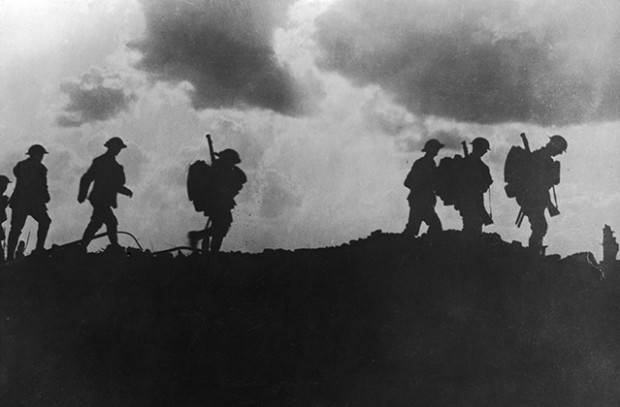
Potsdam negotiations
The assassination of Archduke Franz Ferdinand caused confusion in Vienna. Chief of the Austrian General Staff Konrad von Getzendorf demanded to immediately attack Serbia. He was supported by the Minister of Foreign Affairs, Count Berchtold. Hungarian Prime Minister Count Tisa expressed a more cautious stance. The elderly emperor Franz Joseph hesitated. He was afraid of harsh actions.
Vienna requested the opinion of Berlin. Austria-Hungary proposed eliminating Serbia from the Balkans. The German government and the General Staff decided that the moment for the outbreak of war was the most favorable. The Russian Empire is not yet ready for war. If Petersburg decides to defend Serbia, it will fail. A great war will begin, but in conditions favorable to the German bloc. If Russia does not intervene in the Austro-Serbian conflict, then Serbia will be destroyed, it will be the victory of Vienna and Berlin. The positions of the Russians on the Balkan Peninsula will be completely destroyed.
On July 5 1914, Kaiser Wilhelm II received the Austrian ambassador in the Potsdam Palace and gave him a direct answer: “Do not mess with this speech” (against Serbia). Berlin promised support if Russia opposes Austria. The German government also promised help to the Austrian ally. This led to the fact that the "party of war" in Vienna prevailed. Supporting the Austrians, the German emperor gathered a military conference. He reported on the likelihood of war. And he received an answer that the army was ready for war.
On 7 July, a government meeting was held in Vienna. Almost all adhered to the position that purely diplomatic success, even in conditions of the complete humiliation of Belgrade, was of no value. Therefore, it is necessary to present such demands to the Serbs in order to force them to refuse and get a reason for military operations. However, the head of the Hungarian government of Tisza objected to this. He expressed concern that the defeat would lead to the death of the empire, and the victory led to the capture of new Slavic lands, the strengthening of the Slavic element in Austria-Hungary, which undermined the position of Hungary. With great difficulty, the count was convinced. This was done by the middle of the month. All this time, Berlin was rushing Vienna, the Germans feared that the Austrians would retreat.
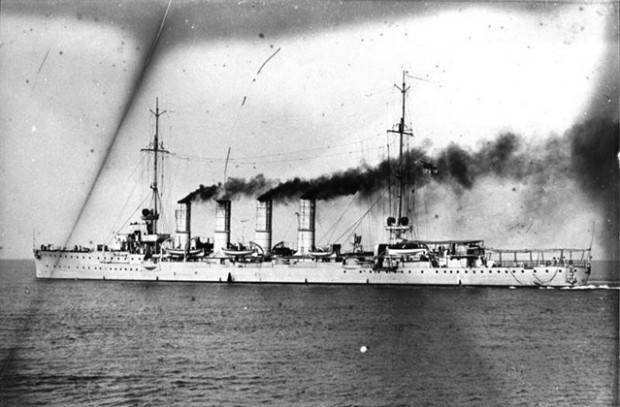
How London gave the green light to war
The British Foreign Office, relying on the best intelligence in the world, was well aware of the situation in Vienna, Berlin and St. Petersburg. The head of the British Foreign Ministry, Sir Gray, knew that the assassination of the Archduke would be used by Austria-Hungary to begin aggression against Serbia, and that Germany supported the Austrians. London also knew that this time Russia would not yield. How should London have acted if it wanted to stop the war? The answer can be found in the recent past. When, during the Second Moroccan Crisis, during the Second Moroccan crisis, the British government publicly and secretly through diplomatic channels arose a warning in Germany that Britain would take the side of France. And Berlin retreated. The same situation arose at the end of 1911: the statement of England that it would not remain neutral caused the moderate effect of Germany on Austria-Hungary.
England could have done the same in the summer of 1914. To maintain peace in Europe, London only had to dispel the illusions of Berlin that Britain would remain aloof. On the contrary, British politics in 1913-1914. supported in the German elite the belief that England would be neutral. How did the head of the British Foreign Office behave these days? In fact, Sir Gray encouraged Austro-German aggression. In conversations with the German ambassador in London, Prince Lichnovsky, 6 and 9 on July, Gray convinced the Germans of Russia's peacefulness and promised to “prevent a thunderstorm.” He assured that England, not connected with Russia and France by any allied obligations, has complete freedom of action. He said that if Austria does not go beyond a certain limit in relation to Serbia, then it will be possible to persuade Petersburg to tolerance.
With respect to St. Petersburg, Gray led a different policy. In a conversation with the Russian ambassador Benckendorff on 8 on July, Gray painted everything in gloomy colors. He spoke about the likelihood of Austro-Hungarian action against Serbia and emphasized the hostility of the Germans to Russia. Thus, the British warned Petersburg of the war, and did not do the same for Berlin. The fact was that in London, as in Berlin, it was believed that the moment for the outbreak of war was ideal. Only the Germans were mistaken, but the British were not. London was satisfied with the fact that Russia was not yet ready for war. England relied on the death of the Russian Empire. The great war in Europe was supposed to be a bomb that would blow up Russia. In addition, the British armed forces were ready for war. “Never in the past three years have we been so well prepared,” wrote Churchill First Lord Admiralty. The British still relied on supremacy at sea, and the English fleet was still the most powerful in the world. And maintaining naval superiority became increasingly difficult for England every year. Germany was rapidly catching up with Britain on naval armaments. The British needed to crush Germany while they maintained dominance at sea.
Therefore, the British did everything so that the war began, thwarted all attempts to resolve the matter peacefully. Shortly before the Austrian ultimatum was presented to Belgrade, Petersburg proposed that Russia, England and France together influence Vienna. Gray rejected this idea. Although in London they knew well what kind of provocative document the Austrian diplomats prepared for Belgrade. On July 23, on the day of the presentation of the Austrian ultimatum to Serbia, the Austrian ambassador in London, Mansdorf, held a conversation with Gray. The British minister spoke about the damage that would be caused to trade by the war of Austria, Russia, Germany and France. He kept silent about the possibility of participating in the war of England. As a result, Vienna decided that London was neutral. It was an encouragement to aggression.
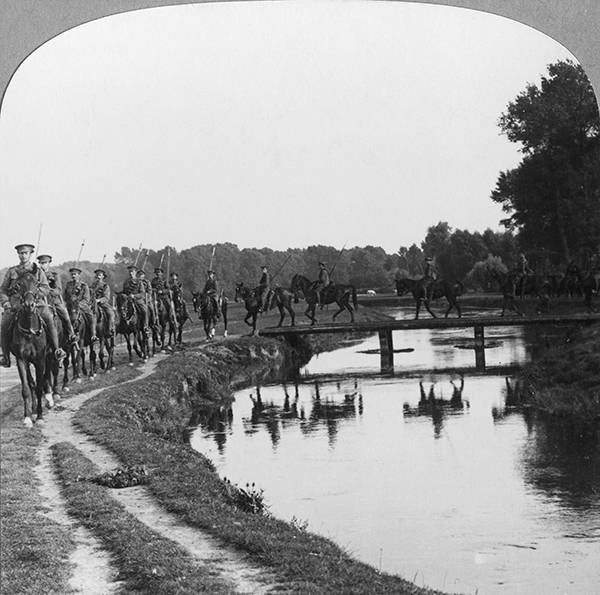
Petersburg position
In the first days after the murder in Sarajevo, Russia was not alarmed. The situation seemed stable. The situation has changed received alarm signals about the aggressiveness of Austria from the ambassador in London Benckendorf and Italians. Foreign Minister Sazonov suggested that Belgrade act with extreme caution. He also warned Berlin and Vienna that Russia would not be indifferent to the humiliation of Serbia. This was also reported by Italy. Thus, the Russian government has shown that this time it will not yield to the threat of war, as it was in 1909, 1912 and 1913.
On July 20, July 1914, French President Poincare and the head of the Council of Ministers Viviani arrived in Russia. The French assured that in the event of a war with Germany, Paris would fulfill its allied obligations. This reinforced the resolve of St. Petersburg.
Austrian ultimatum and the beginning of the war
23 July 1914 Vienna presented the ultimatum to Belgrade with an 48-hour deadline for a response. It was a provocation. Austrian claims violated the sovereignty of Serbia. Belgrade immediately turned to Russia with a request for protection. On 24 of July, after reading an ultimatum, Sazonov said: “This is a European war!” The Russian government invited the Serbs, in case of an Austrian invasion, if they could not defend themselves, not resist and declare that they were giving in to power and handing their fate to the great powers. Serbia recommended all moderation. It was also decided, if necessary, to begin the mobilization of four military districts in the west.
Petersburg felt insecure. They are not ready for war; the position of England is not entirely clear. Sazonov was nervous. Either offered the great powers to exert a collective diplomatic influence on Austria-Hungary, then suggested that England or Italy become mediators in the settlement of the Austro-Serbian conflict. However, everything was in vain.
25 July Serbian Prime Minister Pasic gave the answer to Austria-Hungary. The Serbs made maximum concessions and accepted nine out of ten demands with reservations. Belgrade refused only to let Austrian investigators into its territory. On the same day, the Austro-Hungarian diplomatic mission left Serbia.
At the same time, London again made it clear to Berlin that it would remain aloof. On July 24 Gray again accepted Lichnovsky. He stated that the conflict between Austria and Serbia did not concern England. He spoke about the danger of war of the four powers (without England), about the damage to world trade, the depletion of countries and the threat of revolution. Gray suggested that Germany exert influence on Vienna so that it showed moderation. So that Austria-Hungary is satisfied with the Serbian response to the ultimatum. On July 26, King George of England spoke with the brother of the German Emperor Heinrich of Prussia. He said that he would do his best to "not be involved in the war and remain neutral." This was what Berlin needed for England to be neutral at the beginning of the war. The German plan was timed to blitzkrieg - a few weeks of war to crush France. The short-term neutrality of Britain completely satisfied the Germans.
The British skillfully divided and pitted. If Berlin was fooled, they gave hope for neutrality, then Petersburg was encouraged, hinted at help. Thus, the British skillfully led the great powers of Europe to a great war. Berlin showed a desire for peace. And France and Russia supported, inspired courage, pushed for active opposition to the Austro-German bloc. The policy of the British cabinet (first of all, its head Asquith and Minister of Foreign Affairs Gray) was dictated by the interests of British capital and the struggle against Germany, which was rapidly torn to a leadership position in the Western world. The imperialist liberals, conservatives, the City (financial capital) and the military were in solidarity on the question of defeating Germany. At the same time, the balance of forces at sea, the development of the arms race (including naval ones), the enormous expenses and domestic political difficulties associated with this did not make it possible to delay the onset of the war. England could not let Germany defeat France and become the leader of the West. In London, they themselves claimed world domination, for this it is necessary to crush the competitor - the Second Reich.
Interestingly, at first most members of the British government leaned toward neutrality. On July 27 the question was raised of Britain’s actions in the event of war. Russia requested military support from England. Most members of the government, led by Lord Morley (11 people), who was the leader of the neutralists who wanted to stay away from the war and profit from it, spoke in favor of neutrality. Only three supported Gray - Prime Minister Asquith, Holden, and Churchill. Part of the cabinet took a wait and see attitude. Gray had to do a great job to convince the majority to join the war. The Germans even helped him in this when they raised the question of the movement of the German army through Belgium. On July 31, Gray asked Berlin and Paris whether they would respect the neutrality of Belgium. The French gave such assurances, the Germans did not. This was the most important argument of the supporters of the war with Germany.
The German emperor belatedly, only on 28 of July, got acquainted with the Serbian response to the ultimatum. I realized that the reason for the war was bad and suggested Vienna to start negotiations. However, this advice was late. On this day, Austria-Hungary declared war on Serbia. The war has begun.
Britain hid its true position until July 29. On this day, Gray held two meetings with the German ambassador. During the first conversation, he did not say anything important. During the second meeting, the British minister first set out to Likhnovsky the true position of England. He said that Britain could remain aloof as long as the conflict is limited to Austria and Russia. In Berlin, they were shocked. Kaiser did not hide his anger: “England opens its cards at the moment when it considered that we were driven into a dead end and were in a hopeless situation! The low bastard bastard tried to trick us with dinners and speeches ... A vile son of a bitch! ”
At the same time, it became known about the neutrality of Italy (an ally of Germany and Austria in the Triple Alliance) and Romania. Rome referred to a violation by Austria-Hungary of the terms of the union agreement. Berlin tried to play back. On the night of July 30, the Germans suddenly began to persuade the Austrians to accept the mediation of peace proposed by England. However, it was too late. The trap slammed shut. The war with Serbia began and Vienna refused to go to peace.
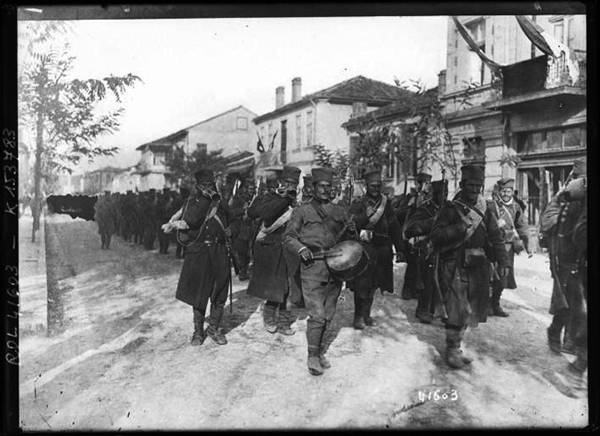
Chain reaction
30 July late in the evening, Berlin stopped pressure on Vienna. The generals spoke out in favor of the war. The strategy of the German Empire was built on the rapid defeat of France and the slowness of mobilization in Russia - over 40 days. At the end of this period, Russia, according to the Germans, could no longer save France. Having done away with the French, the Germans and the Austrians had to strike at Russia with all their might and withdraw it from the war. Therefore, every day of Russian military preparations was considered extremely dangerous for the Second Reich. He shortened the time when it was possible to beat the French calmly. Therefore, Berlin acted on the basis of mobilization in Russia.
On 28 of July, mobilization began in Austria-Hungary. The Russian government also decided to start mobilization. German diplomacy tried to prevent this. On July 28, Kaiser Wilhelm II promised Nicholas II to influence Vienna to reach an agreement with Russia. On July 29, the German ambassador to Russia Purtales conveyed to Sazonov the demand of Berlin to stop mobilization, otherwise Germany would also begin mobilization and war. At the same time, Petersburg learned about the Austrian bombing of Belgrade. On the same day, under pressure from the Chief of the General Staff Yanushkevich, the king approved a decree on general mobilization. Late in the evening, Nikolai canceled this decree. Kaiser again promised him that he would try to reach an agreement between St. Petersburg and Vienna and asked Nikolai not to conduct military events. The king decided to limit himself to partial mobilization directed against the Austro-Hungarian empire.
Sazonov, Yanushkevich and Sukhomlinov (Minister of War) worried that the tsar had succumbed to the influence of the Kaiser, on July 30 tried to convince Nicholas II. They believed that every day of procrastination could be fatal to the army and empire. In the end, Sazonov convinced the king. In the evening of July 30, general mobilization began. At midnight on July 31, the German ambassador informed Sazonov that if on August 1 by 12 hours Russia did not give up mobilization, the German Empire would also begin mobilization. 1 August Second Reich began a general mobilization. On the same day in the evening, the German ambassador again came to Sazonov and asked about the answer on the question of mobilization. Sazonov refused. Purtales handed over a declaration of war. Thus began the Russian-German war. A war in which the Russians and Germans were not interested. Great war in the interests of England.
On August 3, in the Pacific Ocean near the island of Tsushima, the German light cruiser Emden began the pursuit of the Russian Volunteer steamer fleet Ryazan (in case of war, the ship could be converted into an auxiliary cruiser). The Russian ship tried to hide in Japanese waters, but the Germans opened fire to defeat and the Ryazan stopped. This ship was the first trophy captured by the Germans from Russia.
The French elite had long ago decided on a war, longed for revenge for the military catastrophe of 1870-1871. But at the same time, Paris wanted the responsibility for starting the war to fall on Berlin. Therefore, on 30 on July 1914, the French sent troops 10 kilometers from the border in order to prevent possible border incidents that could give the Germans a reason for war. On 31 of July, the German ambassador handed the note to the French; France was to give a binding obligation to be neutral. The answer was given 18 hours. If the French agreed, Berlin would require Toul and Verdun fortresses as collateral. That is, the Germans did not need the neutrality of France. Paris refused to bind itself with any obligations. 1 August Poincare began mobilization. On 1-2 on August, German troops occupied Luxembourg without a fight and reached the French border. 3 August Germany declared war on France. The Germans accused the French of assaults, air attacks and violation of the neutrality of Belgium.
On August 2, Germany presented the ultimatum to Belgium. The Germans demanded to withdraw the Belgian army to Antwerp and not interfere with the movement of German corps to the borders of France. Belgium promised to maintain integrity and independence. Germany, along with other powers, was the guarantor of the independence of Belgium and used to violate the country's neutrality information that France was preparing an army on the Meuse for an attack on Namur. Belgium rejected an ultimatum and asked for help from England. On 4 of August, the German army violated the border of Belgium and 5 of August reached Liège. The Belgian question helped Gray defeat his opponents, the supporters of the neutrality of England. The security of the Belgian coast was of strategic importance to Britain. London got a reason to intervene in the war.
2 August, London promised Paris the protection of the French coast. On the morning of August 3, the English cabinet decided to participate in the war. In the afternoon, Gray spoke in Parliament. He said that peace in Europe could not be maintained, as some countries sought war (meaning Germany and Austria-Hungary). That England should intervene in the war to defend France and Belgium. Parliament supported the government. On August 4, London presented an ultimatum to Berlin, demanding unconditional neutrality of Belgium. The Germans had to give an answer before 11 in the evening. There was no response. The German plan of war with France was based on an invasion through Belgium, the Germans could no longer stop the flywheel of the war. Britain declared war on Germany. Thus began the world war.
On August 4, the United States declared neutrality, and abided by it until April 1917. Neutrality allowed the United States to cash in on the war. States from the debtor have become a global lender, the financial center of the planet. On August 5, Latin American countries declared neutrality. On August 6, the Austro-Hungarian Empire declared war on Russia, and Serbia and Montenegro declared Germany. 10 August, France declared war on Austria.
On 7 of August, two German armies crossed Mass and began moving to Brussels and Charleroi. The Belgian army was concentrated for the defense of Brussels and Antwerp, where the Belgians held out until August 18. On 8 on August, the British expeditionary army began a landing in France. The French were preparing for the offensive. In the Balkan Theater there were stubborn fights. The Serbs abandoned the defense of Belgrade and moved the capital to Nis. On the Russian front, the first skirmishes of Russian and Austrian troops in southern Poland took place. Russia was preparing an offensive in the Warsaw direction. On August 17, the East Prussian operation of the Russian army began. The 1-I and 2-I Russian armies were to occupy East Prussia and defeat the 8-th German army. This operation was supposed to secure the offensive of the Russian army on the Warsaw-Berlin direction from the northern flank.
12 August, England declared war on the Austro-Hungarian Empire. Japan decided to use the opportunity to expand its sphere of influence in the Asia-Pacific region. On August 15, Tokyo presented Berlin with an ultimatum demanding the withdrawal of troops from the German-owned port of Qingdao in China. The Japanese demanded that they be given the Shandong Peninsula and the German colonies in the Pacific. With no response, Japan declared war on Germany on August 23. 25 August, Japan declared war on Austria. This event was a favorable factor for Russia, since it secured the rear in the Far East. Russia could concentrate all its forces on the Western Front. Japan supplied Russia with weapons.
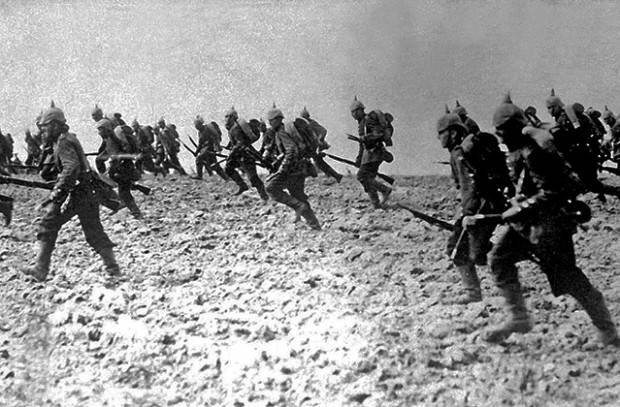
- Alexander Samsonov
- The beginning of the First World War
Trap for Russia
War of England against Russia, Germany and the Slavs of the Balkans
Information